10 oct 2019
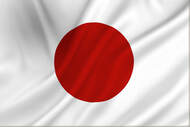
Grant contracts for six grassroots human security projects (GGP) were signed today by Masayuki Magoshi, Ambassador for the Palestinian Affairs and Representative of Japan to Palestine, and the representatives of Joint Service Council for Solid Waste Management - North and North West of Jerusalem, Agricultural Society for the Wall Affected, Palestinian Youth Union/ PYU, Jericho Women Charitable Society, Beit Sahour Cooperative Society, and Gruppo di Volontariato Civile at the Representative Office of Japan to Palestine in Ramallah for a total amount of $534,410.
Joint Service Council for Solid Waste Management will use a fund of $90,180 for the installation of 540 waste containers. This project aims at improving the solid waste management and ensuring safe environment and public health for 16 communities in north and northwest Jerusalem.
The Agricultural Society for the Wall Affected will use a fund of $90,000 for installing solar panel system in Alwalaydeh Bedouin community. This project aims at improving the access to electricity, so that farmers will be able to use the electricity in producing dairy products as a source of income.
Palestinian Youth Union/ PYU will use a fund of $89,971 for the installation and the rehabilitation of 11 schools for students with disabilities. The construction under this project will provide 16 wheel chair slopes, 113 toilets (7 multipurpose toilets), and 7 water drinking places.
Jericho Women Charitable Society will use a fund of $90,279 for installing solar panel system at the society school with the aim of providing sufficient power for the operation of air conditioning systems in the classrooms as well as improving the educational environments for the students in the Jericho Women Charitable Society.
Beit Sahour Cooperative Society for Health Welfare will use a fund of $89,500 for providing the hospital with Endoscopy unit. It aims at improving the medical services of the Shepherd’s Field Hospital, so it will no longer refer patients to other medical centers.
Gruppo di Volontariato Civile will use a fund of $84,480 to improve the access to water resources in three areas located in Tubas and Qalqilya governorates. This will be achieved through the construction and the rehabilitation of 15 water cisterns in Khirbet Yarza and Al Aqaba in Tubas Governorate as well as the extension of 1.2 km main irrigation pipeline and the installation of five water tanks in Azzoun in Qalqilya Governorate.
Magoshi congratulated the recipients of the grants and wished them success in their projects. He emphasized Japan’s firm commitment of supporting Palestinian people from human security perspective as well as the importance of implementing social and economic development projects needed for Palestinian communities.
Since 1993 the Government of Japan has extended its official development assistance amounting to approximately $1.9 billion to the Palestinians. GGP projects have been formulated in collaboration with the Palestinian Authority through Ministry of Finance and Planning since 2010.
Joint Service Council for Solid Waste Management will use a fund of $90,180 for the installation of 540 waste containers. This project aims at improving the solid waste management and ensuring safe environment and public health for 16 communities in north and northwest Jerusalem.
The Agricultural Society for the Wall Affected will use a fund of $90,000 for installing solar panel system in Alwalaydeh Bedouin community. This project aims at improving the access to electricity, so that farmers will be able to use the electricity in producing dairy products as a source of income.
Palestinian Youth Union/ PYU will use a fund of $89,971 for the installation and the rehabilitation of 11 schools for students with disabilities. The construction under this project will provide 16 wheel chair slopes, 113 toilets (7 multipurpose toilets), and 7 water drinking places.
Jericho Women Charitable Society will use a fund of $90,279 for installing solar panel system at the society school with the aim of providing sufficient power for the operation of air conditioning systems in the classrooms as well as improving the educational environments for the students in the Jericho Women Charitable Society.
Beit Sahour Cooperative Society for Health Welfare will use a fund of $89,500 for providing the hospital with Endoscopy unit. It aims at improving the medical services of the Shepherd’s Field Hospital, so it will no longer refer patients to other medical centers.
Gruppo di Volontariato Civile will use a fund of $84,480 to improve the access to water resources in three areas located in Tubas and Qalqilya governorates. This will be achieved through the construction and the rehabilitation of 15 water cisterns in Khirbet Yarza and Al Aqaba in Tubas Governorate as well as the extension of 1.2 km main irrigation pipeline and the installation of five water tanks in Azzoun in Qalqilya Governorate.
Magoshi congratulated the recipients of the grants and wished them success in their projects. He emphasized Japan’s firm commitment of supporting Palestinian people from human security perspective as well as the importance of implementing social and economic development projects needed for Palestinian communities.
Since 1993 the Government of Japan has extended its official development assistance amounting to approximately $1.9 billion to the Palestinians. GGP projects have been formulated in collaboration with the Palestinian Authority through Ministry of Finance and Planning since 2010.
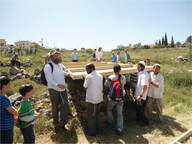
Israeli settlers today seized a water spring in Ein el-Hilweh in the northern Jordan Valley, according to a local source.
Mahdi Daraghmeh, head of al-Maleh village council, said that settlers seized the water spring and then immediately started restoration work on it.
They also prevented people from watering their crops from the spring, which they have been doing to decades.
Meanwhile, Israeli forces razed Palestinian lands in al-Himma in the northern Jordan Valley and also handed a halt on construction order against a structure in Homsa.
Motaz Bisharat, in charge of the Jordan Valley file in the Toubas district, told WAFA that the razing took place on lands near an illegal settlement outpost in al-Himma area without any reason.
The army also gave a stop work order in al-Homsa, he said.
Mahdi Daraghmeh, head of al-Maleh village council, said that settlers seized the water spring and then immediately started restoration work on it.
They also prevented people from watering their crops from the spring, which they have been doing to decades.
Meanwhile, Israeli forces razed Palestinian lands in al-Himma in the northern Jordan Valley and also handed a halt on construction order against a structure in Homsa.
Motaz Bisharat, in charge of the Jordan Valley file in the Toubas district, told WAFA that the razing took place on lands near an illegal settlement outpost in al-Himma area without any reason.
The army also gave a stop work order in al-Homsa, he said.
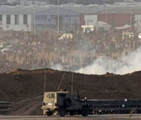
Israeli soldiers fired, Thursday, several rounds of live ammunition at Palestinian farmers in the ar-Taqa area, east of Gaza city.
Media sources said the soldiers fired the live rounds at the farmers who were not even close to the “buffer zone” near the fence but were just working on their lands.
They added that the farmers had to leave their lands in fear of further Israeli military escalation.
In related news, the soldiers fired many gas bombs at the Great Return March camp, east of Khuza’a town, east of Khan Younis, in the southern part of the Gaza Strip.
Media sources said the soldiers fired the live rounds at the farmers who were not even close to the “buffer zone” near the fence but were just working on their lands.
They added that the farmers had to leave their lands in fear of further Israeli military escalation.
In related news, the soldiers fired many gas bombs at the Great Return March camp, east of Khuza’a town, east of Khan Younis, in the southern part of the Gaza Strip.
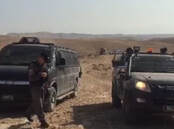
Israeli soldiers invaded, Thursday, Khirbat ad-Daqeeqa small community, east of Yatta town, south of the southern West Bank city of Hebron, and demolished several residential sheds, in addition to confiscating solar panels.
Rateb Jabour, the coordinator of the National and Popular Committee against the Annexation Wall and Colonies in Southern West Bank, said the soldiers demolished many residential sheds and structures in Shu’ab al-Haratheen area in the ad-Daqeeqa community.
He added that the soldiers also confiscated solar panels, used for generating electricity by Jamil Mahmoud Najajra, and his son Mahmoud.
The soldiers were still in the village at the time of this report, an issue that raises fear among the residents of further demolitions and violations.
Rateb Jabour, the coordinator of the National and Popular Committee against the Annexation Wall and Colonies in Southern West Bank, said the soldiers demolished many residential sheds and structures in Shu’ab al-Haratheen area in the ad-Daqeeqa community.
He added that the soldiers also confiscated solar panels, used for generating electricity by Jamil Mahmoud Najajra, and his son Mahmoud.
The soldiers were still in the village at the time of this report, an issue that raises fear among the residents of further demolitions and violations.
9 oct 2019
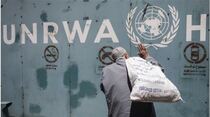
Within the framework of the Palestinian Central Bureau of Statistics (PCBS) policy of disseminating data using modern tools of dissemination, PCBS has launched the dynamic database of Poverty map 2017 in Palestine (Atlas of Poverty).
The topics covered by the atlas adhere to international recommendations and are tailored to the needs of the Palestinian context to clarify the causes and scale of poverty.
This project used the data available from the expenditure and consumption survey 2017 and census 2017.
These maps cover the demographic and social characteristics of households, individuals and certain geographic characteristics of Palestinian localities.
We hope that this poverty map will assist researchers, policymakers and decision makers, and will be an effective valuable tool in the development of plans and policies.
To access the database platform(Atlas of Poverty) , please check the link:
The topics covered by the atlas adhere to international recommendations and are tailored to the needs of the Palestinian context to clarify the causes and scale of poverty.
This project used the data available from the expenditure and consumption survey 2017 and census 2017.
These maps cover the demographic and social characteristics of households, individuals and certain geographic characteristics of Palestinian localities.
We hope that this poverty map will assist researchers, policymakers and decision makers, and will be an effective valuable tool in the development of plans and policies.
To access the database platform(Atlas of Poverty) , please check the link:
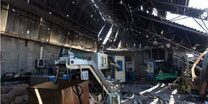
A Palestinian legislator says 100 percent of factories in the blockaded Gaza Strip has been completely or partially affected by the 14-year-long siege imposed by the Israeli regime on the enclave and successive assaults against the sliver.
Palestinian lawmaker Jamal al-Khudari, who is the head of the Popular Committee against the Siege on Gaza (PCAS), made the remarks, saying the occupying regime is deliberately targeting the Palestinian economy, especially the industrial sector.
He said Tel Aviv is still imposing restrictions on the entry of industrial materials into the besieged territory under the pretext of dual use, the Palestine Information Center quoted him as saying.
Khudari, who is originally an academic and businessman, also pointed out that these measures have exacerbated the suffering of factory owners, workers and technicians.
According to the Palestinian legislator, the direct and indirect losses inflicted on Gaza, including on such sectors as industry, commerce, agriculture and business, are estimated to be at $70 million every month.
Khudari also affirmed that 3,500 factories had already shut down in the sliver, whose poverty rate has reached 85 percent and its unemployment rate exceeded 60 percent.
He stressed that removing the blockade is the only solution to end the suffering of Gazans, calling on the international community to exert more effort to pressure Tel Aviv to lift its crippling siege.
The Gaza Strip has been under an Israeli blockade since June 2007. It has caused a decline in the standard of living as well as unprecedented levels of unemployment and unrelenting poverty.
The occupying regime has imposed three major wars against Gaza, killing thousands of people each time and shattering the impoverished territory’s already poor infrastructure.
The economic situation across Palestinian lands worsened after the US earlier this year cut all its financial aid for Palestinians in the occupied West Bank and Gaza.
The cuts in the humanitarian aid were soon hitting hundreds of thousands of the most vulnerable people, especially in Gaza, where 80 percent are dependent on aid.
Palestinians have held weekly rallies along the Gaza fence to protest the siege on the enclave and demand the right for the refugees, who were forced to leave during the 1948 creation of Israel, to return to their homes.
Some 310 Palestinians have been killed by Israeli forces ever since the anti-occupation protest rallies began in Gaza on March 30, 2018. Over 16,000 Palestinians have also sustained injuries.
Palestinian lawmaker Jamal al-Khudari, who is the head of the Popular Committee against the Siege on Gaza (PCAS), made the remarks, saying the occupying regime is deliberately targeting the Palestinian economy, especially the industrial sector.
He said Tel Aviv is still imposing restrictions on the entry of industrial materials into the besieged territory under the pretext of dual use, the Palestine Information Center quoted him as saying.
Khudari, who is originally an academic and businessman, also pointed out that these measures have exacerbated the suffering of factory owners, workers and technicians.
According to the Palestinian legislator, the direct and indirect losses inflicted on Gaza, including on such sectors as industry, commerce, agriculture and business, are estimated to be at $70 million every month.
Khudari also affirmed that 3,500 factories had already shut down in the sliver, whose poverty rate has reached 85 percent and its unemployment rate exceeded 60 percent.
He stressed that removing the blockade is the only solution to end the suffering of Gazans, calling on the international community to exert more effort to pressure Tel Aviv to lift its crippling siege.
The Gaza Strip has been under an Israeli blockade since June 2007. It has caused a decline in the standard of living as well as unprecedented levels of unemployment and unrelenting poverty.
The occupying regime has imposed three major wars against Gaza, killing thousands of people each time and shattering the impoverished territory’s already poor infrastructure.
The economic situation across Palestinian lands worsened after the US earlier this year cut all its financial aid for Palestinians in the occupied West Bank and Gaza.
The cuts in the humanitarian aid were soon hitting hundreds of thousands of the most vulnerable people, especially in Gaza, where 80 percent are dependent on aid.
Palestinians have held weekly rallies along the Gaza fence to protest the siege on the enclave and demand the right for the refugees, who were forced to leave during the 1948 creation of Israel, to return to their homes.
Some 310 Palestinians have been killed by Israeli forces ever since the anti-occupation protest rallies began in Gaza on March 30, 2018. Over 16,000 Palestinians have also sustained injuries.
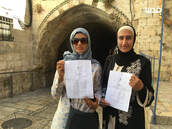
Maysaa Abu Ghazala and Sundus Owais
The Israeli occupation forces (IOF) at dawn Wednesday kidnaped five Palestinian citizens during campaigns in the West Bank and Jerusalem.
A statement released by the Israeli army claimed the five detainees were wanted by the security authorities for their involvement in activities against Israel.
According to local sources, the IOF kidnaped 16-year-old Mohamed Abu Diya from his home in Khirbet Safa village near Beit Ummar town in the north of al-Khalil.
Another two young men were taken prisoners during dawn police raids on their homes in the Jerusalem district of Silwan. They were identified as Naser Ajjaj and Tayseer Abu Subaih.
Later in the morning, the Israeli police in Jerusalem summoned two female journalists called Maysaa Abu Ghazala and Sundus Owais for interrogation after they documented Israeli violations at the Aqsa Mosque.
In a separate incident, the IOF confiscated on Tuesday a Palestinian-owned bulldozer in Atouf area, southeast of Tubas, without providing a reason for its measure.
The Israeli occupation forces (IOF) at dawn Wednesday kidnaped five Palestinian citizens during campaigns in the West Bank and Jerusalem.
A statement released by the Israeli army claimed the five detainees were wanted by the security authorities for their involvement in activities against Israel.
According to local sources, the IOF kidnaped 16-year-old Mohamed Abu Diya from his home in Khirbet Safa village near Beit Ummar town in the north of al-Khalil.
Another two young men were taken prisoners during dawn police raids on their homes in the Jerusalem district of Silwan. They were identified as Naser Ajjaj and Tayseer Abu Subaih.
Later in the morning, the Israeli police in Jerusalem summoned two female journalists called Maysaa Abu Ghazala and Sundus Owais for interrogation after they documented Israeli violations at the Aqsa Mosque.
In a separate incident, the IOF confiscated on Tuesday a Palestinian-owned bulldozer in Atouf area, southeast of Tubas, without providing a reason for its measure.
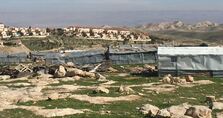
The Israeli occupation authority (IOA) intends to turn a vast tract of Palestinian land in the Khan al-Ahmar area between Jerusalem and the Dead Sea into a garbage dump.
The IOA also plans to establish a waste recycling plant in the same area, according to Jerusalem affairs researcher Fakhri Abu Diyab.
Abu Diyab affirmed that the IOA plans to seize 900 of dunums of Palestinian land and expel Palestinian residents from the area in order to establish the dump and the recycling facility.
He warned that such Israeli project would have negative impacts on the environment and the health of the native population in the area.
He pointed out that about 250 to 300 trucks would unload about 3,500 tons of waste every day in the area.
The researcher said he obtained such information from Israeli plans in Area C of the West Bank as well as from environmental institutions and some leftist political figures.
The IOA also plans to establish a waste recycling plant in the same area, according to Jerusalem affairs researcher Fakhri Abu Diyab.
Abu Diyab affirmed that the IOA plans to seize 900 of dunums of Palestinian land and expel Palestinian residents from the area in order to establish the dump and the recycling facility.
He warned that such Israeli project would have negative impacts on the environment and the health of the native population in the area.
He pointed out that about 250 to 300 trucks would unload about 3,500 tons of waste every day in the area.
The researcher said he obtained such information from Israeli plans in Area C of the West Bank as well as from environmental institutions and some leftist political figures.
8 oct 2019
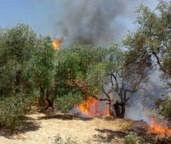
A group of fanatic illegal Israeli colonialist settlers burnt, Tuesday, dozens of Palestinian olive trees in Burin village, south of the northern West Bank city of Nablus, the WAFA Palestinian News Agency has reported.
Eyewitnesses said the armed paramilitary colonists invaded olive orchards in the area between Burin and Huwwara and burnt the trees.
They added that the fire consumed at least 70 olive trees, before Palestinian firefighters managed to extinguish it.
The attack was carried out less the 24 hours after the colonists cut and uprooted 36 Palestinian olive trees in isolated behind the illegal Annexation Wall, and the Palestinians cannot enter them without a permit from the Israeli army.
Eyewitnesses said the armed paramilitary colonists invaded olive orchards in the area between Burin and Huwwara and burnt the trees.
They added that the fire consumed at least 70 olive trees, before Palestinian firefighters managed to extinguish it.
The attack was carried out less the 24 hours after the colonists cut and uprooted 36 Palestinian olive trees in isolated behind the illegal Annexation Wall, and the Palestinians cannot enter them without a permit from the Israeli army.
7 oct 2019
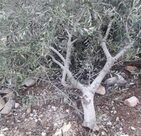
Israeli forces bulldozed around 30 dunams of Palestinian lands, in an area adjacent to the illegal Israeli settlement of Kharsina, to the east of the southern West Bank district of Hebron, as a prelude to the construction of a new settlement outpost, there, said a local activist.
Abd al-Hadi Hantash, an expert in settlements and maps, said Israeli bulldozers razed around 30 dunams of land, then laid base course — a layer of material used for the construction of roads — and removed the electricity poles belonging to the Hebron municipality, cutting off power to several Palestinian residents in the area, as a prelude to build a new settlement outpost there.
Israeli forces paved a road in the said area almost two months ago, in order to connect the new settlement outpost with other nearby settlements located adjacent to Bypass Road 60, built on confiscated Palestinian land.
In related news, extremist Israeli settlers, today, chopped dozens of olive trees, in the village of Burin, to the south of the occupied West Bank city of Nablus, said local WAFA sources.
The sources said that settlers from Yitzhar, an illegal settlement inhabited by hardline extremist Jews, uprooted about 36 olive trees in the area of “Khillet al-Goul”, an area which belongs to the villagers of Burin.
Meanwhile, students were evicted from Burin High School, after the guard of the aforementioned settlement drew his gun on them.
The school’s principal, Ibraheem Omran, said that the school was evicted after the guard made threats and called Israeli soldiers to the scene.
Attacks on education by Israeli military forces and Israeli settlers, in the Palestinian territories, constitute grave violations of children’s rights to education and development. These attacks are particularly prevalent in the most vulnerable areas of the West Bank – Area C, H2 and Jerusalem.
Settler violence against Palestinians and their property is routine in the West Bank and is rarely prosecuted by Israeli authorities.
Settler violence includes property and mosque arsons, stone-throwing, uprooting of crops and olive trees, attacks on vulnerable homes, among others.
Between 500,000 and 600,000 Israelis live in Jewish-only settlements across occupied East Jerusalem and the West Bank in violation of international law.
Furthermore, today, the Israeli military halted the construction of a water collection well and detained three Palestinians in Khirbet Samra, in the northern Jordan Valley.
Aref Daraghmeh, a local activist, said that an Israeli military force broke into Khirber Samra, preventing three workers from proceeding with the restoration works of a water collection well, before detaining them.
The valley, which is a fertile strip of land running west along the Jordan River, is home to about 65,000 Palestinians and makes up approximately 30% of the West Bank.
Since 1967, when the Israeli army occupied the West Bank, Israel has transferred at least 11,000 of its Jewish citizens to the Jordan Valley. Some of the settlements in which they live were built almost entirely on private Palestinian land.
The Israel military has also designated about 46 percent of the Jordan Valley as a closed military zone since the beginning of the occupation in June of 1967, and has been utilizing the pretext of military drills to forcefully displace Palestinian families living there, as part of a policy of ethnic cleansing and stifling Palestinian development in the area.
Approximately 6,200 Palestinians live in 38 communities in places earmarked for military use, and have had to obtain permission from Israeli authorities to enter and live in their communities.
In violation of international law, the Israeli military not only temporarily displaces the communities on a regular basis, but also confiscates their farmlands, demolishing their homes and infrastructure, from time to time.
Besides undergoing temporary displacement, the Palestinian families living there face a myriad restrictions on access to resources and services.
Meanwhile, Israel exploits the resources of the area and generates profit by allocating generous tracts of land and water resources for the benefit of settlers.
Israeli politicians have made it clear, on several occasions, that the highly strategic Jordan Valley area would remain under their control, in any eventuality.
Abd al-Hadi Hantash, an expert in settlements and maps, said Israeli bulldozers razed around 30 dunams of land, then laid base course — a layer of material used for the construction of roads — and removed the electricity poles belonging to the Hebron municipality, cutting off power to several Palestinian residents in the area, as a prelude to build a new settlement outpost there.
Israeli forces paved a road in the said area almost two months ago, in order to connect the new settlement outpost with other nearby settlements located adjacent to Bypass Road 60, built on confiscated Palestinian land.
In related news, extremist Israeli settlers, today, chopped dozens of olive trees, in the village of Burin, to the south of the occupied West Bank city of Nablus, said local WAFA sources.
The sources said that settlers from Yitzhar, an illegal settlement inhabited by hardline extremist Jews, uprooted about 36 olive trees in the area of “Khillet al-Goul”, an area which belongs to the villagers of Burin.
Meanwhile, students were evicted from Burin High School, after the guard of the aforementioned settlement drew his gun on them.
The school’s principal, Ibraheem Omran, said that the school was evicted after the guard made threats and called Israeli soldiers to the scene.
Attacks on education by Israeli military forces and Israeli settlers, in the Palestinian territories, constitute grave violations of children’s rights to education and development. These attacks are particularly prevalent in the most vulnerable areas of the West Bank – Area C, H2 and Jerusalem.
Settler violence against Palestinians and their property is routine in the West Bank and is rarely prosecuted by Israeli authorities.
Settler violence includes property and mosque arsons, stone-throwing, uprooting of crops and olive trees, attacks on vulnerable homes, among others.
Between 500,000 and 600,000 Israelis live in Jewish-only settlements across occupied East Jerusalem and the West Bank in violation of international law.
Furthermore, today, the Israeli military halted the construction of a water collection well and detained three Palestinians in Khirbet Samra, in the northern Jordan Valley.
Aref Daraghmeh, a local activist, said that an Israeli military force broke into Khirber Samra, preventing three workers from proceeding with the restoration works of a water collection well, before detaining them.
The valley, which is a fertile strip of land running west along the Jordan River, is home to about 65,000 Palestinians and makes up approximately 30% of the West Bank.
Since 1967, when the Israeli army occupied the West Bank, Israel has transferred at least 11,000 of its Jewish citizens to the Jordan Valley. Some of the settlements in which they live were built almost entirely on private Palestinian land.
The Israel military has also designated about 46 percent of the Jordan Valley as a closed military zone since the beginning of the occupation in June of 1967, and has been utilizing the pretext of military drills to forcefully displace Palestinian families living there, as part of a policy of ethnic cleansing and stifling Palestinian development in the area.
Approximately 6,200 Palestinians live in 38 communities in places earmarked for military use, and have had to obtain permission from Israeli authorities to enter and live in their communities.
In violation of international law, the Israeli military not only temporarily displaces the communities on a regular basis, but also confiscates their farmlands, demolishing their homes and infrastructure, from time to time.
Besides undergoing temporary displacement, the Palestinian families living there face a myriad restrictions on access to resources and services.
Meanwhile, Israel exploits the resources of the area and generates profit by allocating generous tracts of land and water resources for the benefit of settlers.
Israeli politicians have made it clear, on several occasions, that the highly strategic Jordan Valley area would remain under their control, in any eventuality.
Page: 39 - 38 - 37 - 36 - 35 - 34 - 33 - 32 - 31 - 30 - 29 - 28 - 27 - 26 - 25 - 24 - 23 - 22 - 21 - 20 - 19 - 18
